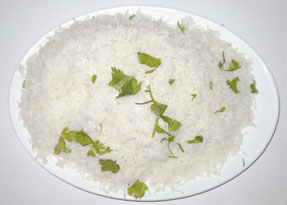Life
Steaming Rice

Sale or use of Basmati rice as a side dish or ingredient shall not be deemed a violation of the prohibition of the sale of rice
The Rhode Island Supreme Court has backed an Indian restaurant’s right to sell basmati rice over the objections of a neighboring Chinese restaurant, which claims monopoly of “white rice” in the food court of the shopping mall where it is located.
The Cathay Cathay Restaurant’s 2001 lease in the Providence Place Mall gives it “exclusive rights” to sell certain Chinese food items, like lo mein and “white rice — boiled or steamed.” However, four years later the mall carved out an exception for the Gourmet India Restaurant, which while prohibiting it from selling white rice, nonetheless provided that the “sale or use of Basmati rice as a side dish or ingredient shall not be deemed a violation of the prohibition of the sale of rice.” Cathay sued Gourmet India for damages and during trial in 2006, its expert offered testimony that his “organoleptic” (based on visual and taste) analysis found the Indian restaurant was serving white rice that was colored yellow. Cathay claims it pays $35,000 a month in rent, nearly twice what Gourmet India pays, for the exclusive rights. Gourmet India’s Yogi Sood insists rice is a central element of Indian cuisine and to not offer rice is akin to selling a “hamburger without a hamburger bun.” To avoid the “hassle” with his neighbor he colors his rice yellow with saffron, which is commonly used in basmati rice. A lower court ruled in 2006 that Gourmet India was within its rights to sell basmati rice under its lease, a decision that has now been ratified by the Rhode Island Supreme Court in January. The court however left open the issue of whether Gourmet India’s lease might violate Cathay’s lease, which may now be the subject of another trial |

